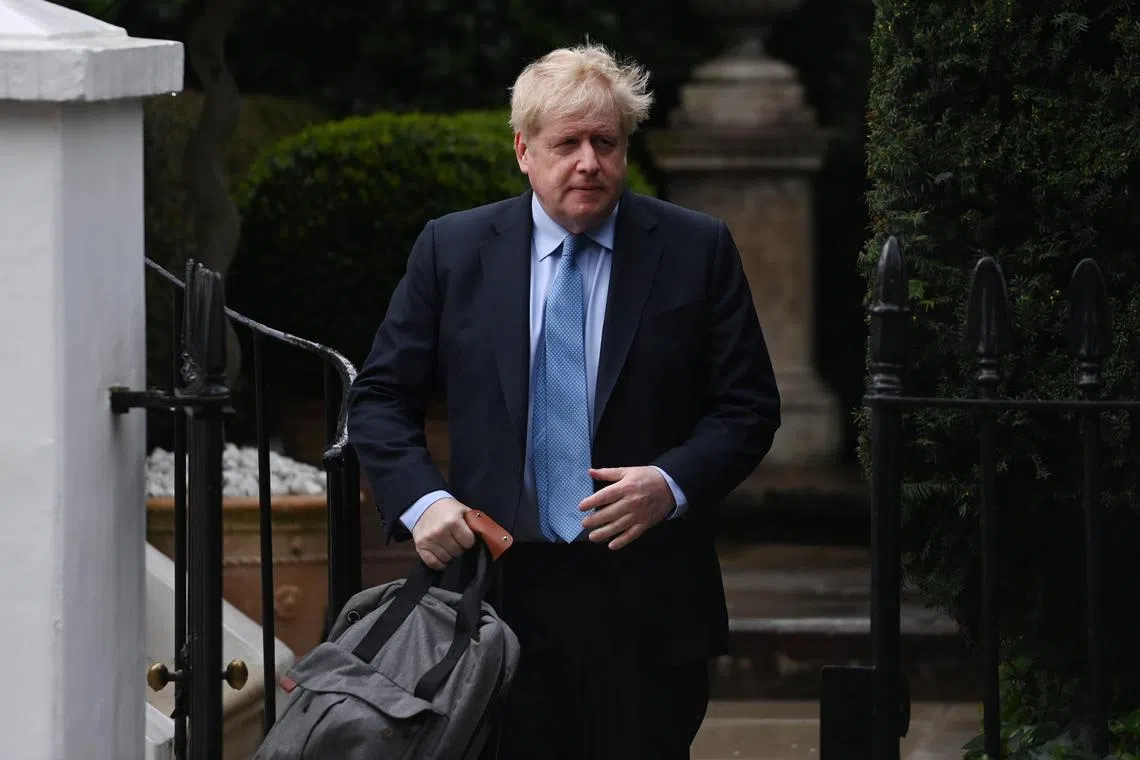‘I did not lie’ to Parliament over UK Covid-19 lockdown parties, says Boris Johnson
Sign up now: Get ST's newsletters delivered to your inbox

Former British PM Boris Johnson is set to give evidence on whether he misled Parliament over rule-breaking Covid-19 lockdown parties.
PHOTO: EPA-EFE
Follow topic:
LONDON - Boris Johnson said he did not lie to the British Parliament over rule-breaking Covid-19 lockdown parties
Parliament’s Committee of Privileges is investigating whether Mr Johnson, who was ousted from Downing Street last September, intentionally or recklessly misled Parliament in a series of statements about the parties.
If the committee finds Mr Johnson intentionally misled Parliament, then he could be suspended from the House of Commons,
Any suspension longer than 10 days could prompt a by-election in his constituency.
The former leader, who considered an audacious bid for a second stint as prime minister
“I’m here to say to you, hand on heart, that I did not lie to the House,” Mr Johnson said. “When those statements were made, they were made in good faith and on the basis of what I honestly knew and believed at the time.”
The committee published 110 pages of evidence on Wednesday, showing that some Downing Street officials said Mr Johnson must have known that parties had taken place despite his denials.
“Misleading the house might sound like a technical issue, but it is a matter of great importance,” Ms Harriet Harman, the chair of the committee, said at the outset of the hearing.
“Misleading intentionally, or recklessly, or refusing to answer, or failing to correct impedes or frustrates the functioning of the House, and is contempt.”
At the start of the hearing, Mr Johnson was made to swear an oath to tell the truth on a Bible before giving his evidence.
He said the inquiry had not found any evidence he deliberately misled Parliament, and said he was banned by the committee from publishing a “large number of extracts” he relied on in his defence.
Mr Johnson denied it would have been “obvious” to him that he had broken rules or guidance, adding that no officials had raised any concerns with him.
If so, it would have been obvious to everyone else there “including the current prime minister”, he said, referring to Mr Sunak.
“On the contrary, the overwhelming evidence which you have assembled, is that these individuals believe that the rules and the guidance were being complied with,” he said.
Mr Dominic Cummings, Mr Johnson’s former top adviser, said it was “comical” the former prime minister thought a garden party in Downing Street in May 2020 was a work event.
“The PM certainly knew it was a drinks party because I told him and, when he walked outside, he saw a drinks party,” said Mr Cummings who, after leaving Downing Street, repeatedly called for Mr Johnson to be ousted.
The so-called “Partygate” scandal ultimately contributed to the downfall of Mr Johnson.
It followed months of reports that he, alongside other senior government figures, had been present at alcohol-fuelled gatherings in Downing Street during 2020 and 2021 when much of the rest of Britain was forced to stay at home.
The outcry and repeated allegations of lying eventually prompted the resignations of most of his top team of government ministers,
In the new evidence published on Wednesday, the Cabinet Secretary Simon Case said he had never given Mr Johnson any assurance that Covid rules had been followed in Downing Street – and that he did not know any officials who did either.
His evidence differs from Mr Johnson’s assertion that officials repeatedly reassured him that the rules had been followed.
Another Downing Street aide said Mr Johnson had the opportunity to “shut down” the parties, but he instead joined in making speeches and drinking with staff.
In an interim report published this month, lawmakers on the committee – made up of seven lawmakers with a majority of members from the governing Conservative Party – said Mr Johnson may have misled Parliament on four occasions, and that the rule-breaking should have been “obvious”.
In a defiant written submission to the committee, Mr Johnson said on Tuesday he had misled Parliament but insisted he “would never have dreamed” of doing so intentionally. He said Mr Cummings bore a grudge and wanted to topple him.
Mr Johnson described some of the allegations he faced from the committee as illogical and absurd, accusing it of being highly partisan.
In passages which are likely to form part of his defence on Wednesday, Mr Johnson said there was no evidence that indicated he intentionally misled Parliament and he was not warned that the events broke any rules.
London police fined Mr Johnson for attending an event to celebrate his birthday
Britain had one of the highest coronavirus death tolls in the world with more than 175,000 deaths by the time Mr Johnson said he would step down as prime minister last summer.
If the committee recommends any sanctions against Mr Johnson, they would have to be approved by Parliament.
Mr Sunak suggested this week that any vote on sanctions against Mr Johnson would be based on lawmakers’ own beliefs rather than along party lines. REUTERS

